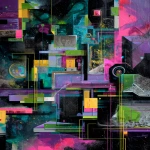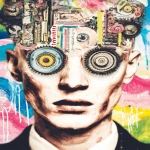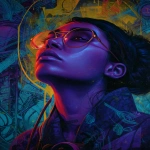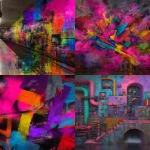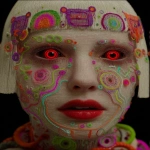Explore the Best AI Image Gallery

Quantum Leaps: Reimagining Creativity with Quantum Computing
The realm of creativity has always been a playground for innovation, constantly pushing the boundaries of human imagination. Now, on the horizon, lies a technology poised to revolutionize this landscape even further: quantum computing. With its unparalleled processing power and ability to tackle complex problems beyond the reach of classical computers, quantum computing promises to unlock new dimensions of creative expression and reshape industries from film and music to design and art.
Unleashing Creative Potential
Quantum computings potential applications in the creative industry are vast and multifaceted:
- Drug Discovery and Material Science: Quantum algorithms can accelerate the process of designing new drugs, materials, and even artistic mediums with unique properties.
- Generative Art and Music: Imagine AI powered by quantum computing generating intricate artworks, mesmerizing music compositions, and immersive soundscapes, pushing the boundaries of artistic expression to entirely new frontiers.
- Personalized Experiences: Quantum computing can enable hyper-personalized creative experiences tailored to individual preferences, creating truly unique and interactive art forms.
- Virtual Reality (VR) and Augmented Reality (AR): Enhanced by quantum processing, VR and AR could deliver richer, more immersive experiences, blurring the lines between reality and imagination.
Ethical Considerations: Navigating Uncharted Territory
As with any powerful technology, quantum computing raises ethical considerations that must be carefully addressed:
- Bias and Fairness: Quantum algorithms trained on biased data can perpetuate existing inequalities in creative industries. Ensuring fairness and inclusivity in algorithm development is crucial.
- Ownership and Copyright: The question of ownership arises when AI powered by quantum computing generates creative content. Establishing clear legal frameworks for intellectual property rights in this new landscape is essential.
- Accessibility and Equity: Access to quantum computing technology should be equitable, preventing a widening gap between those who can leverage its power and those who cannot.
The Quantum Future: A Collaborative Canvas
The future of creativity in the age of quantum computing is brimming with possibilities. This transformative technology has the potential to:
- Democratize Creativity: Empower individuals with tools to express themselves creatively, regardless of technical expertise.
- Foster Collaboration: Break down geographical barriers and enable global collaborations between artists, designers, and technologists.
- Drive Innovation: Spark new ideas, concepts, and artistic mediums that were previously unimaginable.
As quantum computing continues to evolve, it is crucial for artists, designers, policymakers, and researchers to engage in open dialogue and collaboration. By embracing this technology responsibly and ethically, we can unlock its full potential to revolutionize creativity and shape a future where imagination knows no bounds.

](https://images.ai-img.art/thumbnails/150/1aa8215ea9a4f6970e81a10bdb4feb3b08d5e1a202c3c7ed2c9380f2f63d5a74.webp)



](https://images.ai-img.art/thumbnails/150/33d5e6d1da2b8ec2c4b8eab20d051c27c26d7a4991a77faf06fd03e96617fb1e.webp)
](https://images.ai-img.art/thumbnails/150/664a559b73eaff070d6f7fc7b3b151718aef9fa3a3f12f90b3c9092ceaa3cb56.webp)










